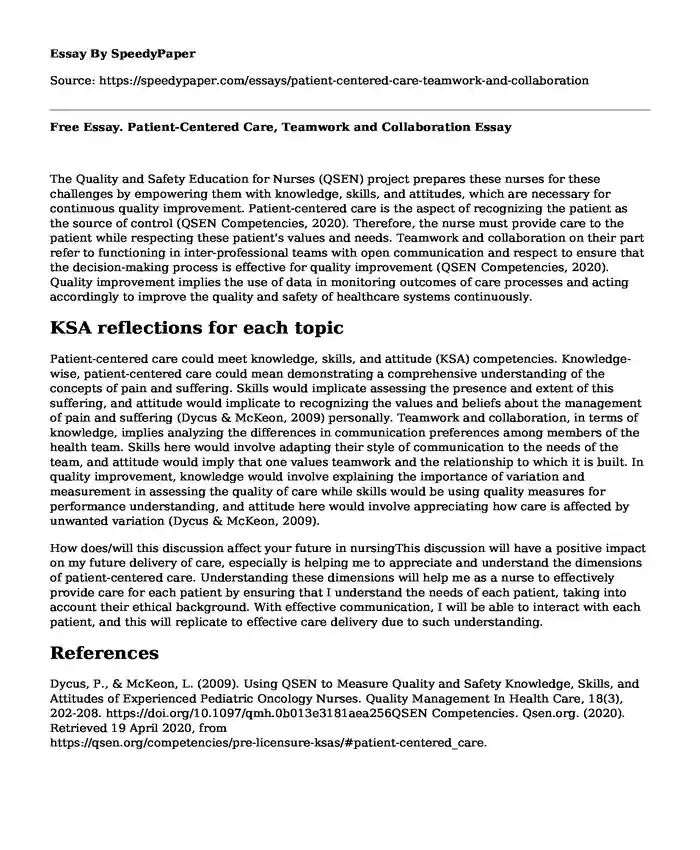
| Type of paper: | Research paper |
| Categories: | Knowledge Nursing care Special education Human services |
| Pages: | 2 |
| Wordcount: | 417 words |
The Quality and Safety Education for Nurses (QSEN) project prepares these nurses for these challenges by empowering them with knowledge, skills, and attitudes, which are necessary for continuous quality improvement. Patient-centered care is the aspect of recognizing the patient as the source of control (QSEN Competencies, 2020). Therefore, the nurse must provide care to the patient while respecting these patient's values and needs. Teamwork and collaboration on their part refer to functioning in inter-professional teams with open communication and respect to ensure that the decision-making process is effective for quality improvement (QSEN Competencies, 2020). Quality improvement implies the use of data in monitoring outcomes of care processes and acting accordingly to improve the quality and safety of healthcare systems continuously.
KSA reflections for each topic
Patient-centered care could meet knowledge, skills, and attitude (KSA) competencies. Knowledge-wise, patient-centered care could mean demonstrating a comprehensive understanding of the concepts of pain and suffering. Skills would implicate assessing the presence and extent of this suffering, and attitude would implicate to recognizing the values and beliefs about the management of pain and suffering (Dycus & McKeon, 2009) personally. Teamwork and collaboration, in terms of knowledge, implies analyzing the differences in communication preferences among members of the health team. Skills here would involve adapting their style of communication to the needs of the team, and attitude would imply that one values teamwork and the relationship to which it is built. In quality improvement, knowledge would involve explaining the importance of variation and measurement in assessing the quality of care while skills would be using quality measures for performance understanding, and attitude here would involve appreciating how care is affected by unwanted variation (Dycus & McKeon, 2009).
How does/will this discussion affect your future in nursingThis discussion will have a positive impact on my future delivery of care, especially is helping me to appreciate and understand the dimensions of patient-centered care. Understanding these dimensions will help me as a nurse to effectively provide care for each patient by ensuring that I understand the needs of each patient, taking into account their ethical background. With effective communication, I will be able to interact with each patient, and this will replicate to effective care delivery due to such understanding.
References
Dycus, P., & McKeon, L. (2009). Using QSEN to Measure Quality and Safety Knowledge, Skills, and Attitudes of Experienced Pediatric Oncology Nurses. Quality Management In Health Care, 18(3), 202-208. https://doi.org/10.1097/qmh.0b013e3181aea256QSEN Competencies. Qsen.org. (2020). Retrieved 19 April 2020, from https://qsen.org/competencies/pre-licensure-ksas/#patient-centered_care.
Cite this page
Free Essay. Patient-Centered Care, Teamwork and Collaboration. (2023, May 22). Retrieved from https://speedypaper.net/essays/patient-centered-care-teamwork-and-collaboration
Request Removal
If you are the original author of this essay and no longer wish to have it published on the SpeedyPaper website, please click below to request its removal:
- Nutrition Essay Sample: Components of a Balanced Diet
- Free Essay about Healthcare Law and Ethics
- Essay Example Analyzing Critical Thinking in Nursing
- Essay Sample on the Impacts and Treatment for Synthetic Designer Drugs
- Essay Sample on Mr. Simmons' Medical Diagnosis
- Palliative Care - Free Paper Sample
- Free Essay Sample: Translation as Intercultural Communication
Popular categories




